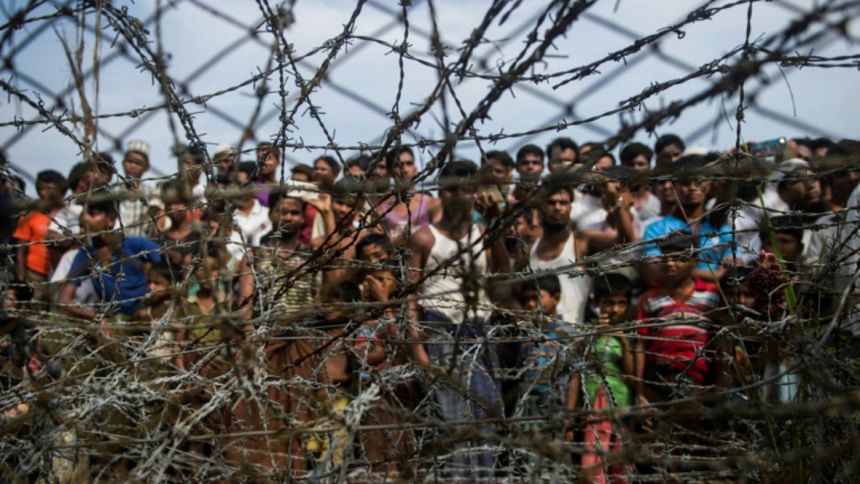What comes after the ICJ ruling?

All eyes were turned to The Hague on Thursday when the International Court of Justice (ICJ) came back with its momentous decision on emergency provisional measures for the protection of the persecuted Rohingya population of Myanmar's northern Rakhine State. Specifically, the UN's top court ordered the following: i) that Myanmar take all measures according to Article II of the Convention to prevent the genocide of the Rohingya, which includes killing, causing serious bodily or mental harm, deliberately inflicting conditions of life calculated to bring about physical destruction in whole or in part, and imposing measures intended to prevent births; ii) that Myanmar ensure that its military, and any irregular armed units supported, controlled or influenced by it, do not commit the above acts, and do not engage in conspiracy, incitement, complicity or attempt to commit genocide: iii) that Myanmar shall take effective measures to prevent the destruction and ensure the preservation of evidence related to the allegations of genocide; and iv) that Myanmar shall submit a report to the Court on all measures taken to give effect to the Order within four months and every six months after that.
The Court's decision in favour of the Rohingya has been hailed as a significant step forward in the fight for justice for the world's most persecuted community. International lawyers and rights activists noted the unanimity of the decision despite the presence of a judge ad hoc nominated by Myanmar, although separate opinions were given later, and hailed the recognition of the Rohingya as "a protected group within the meaning of Article II of the Genocide Convention." Given Myanmar's efforts to strip the Rohingya of their identity and erase even the term "Rohingya", first by excluding them from one of the 135 officially recognised ethnic groups that live in Myanmar through the 1982 Citizenship Law and then by forcing them to accept the identity of ethnic Bengalis in order to receive national verification cards, this is nothing short of a moral victory for the now stateless community. When Nobel Laureate Aung Sun Suu Kyi shocked the world by deciding to personally defend her country's military at the international court's hearing last month, even she refused to use the word "Rohingya" once, despite delivering a 3,379-word speech—a telling identification of just how deep the racial divides run in Myanmar.
When the court order was being read out by presiding Judge Abdulaqawi Ahmed Yusuf, the strong turn of words being used was difficult to ignore. At the very onset, it was established that "at least some of the acts alleged by the Gambia are capable of falling within the provisions of the Convention" and it is possible to establish, prima facie, the existence of a dispute between the two parties. The Court's simple and blunt refusal of Myanmar's request to throw out the case because of a "lack of jurisdiction" is also telling, as is their acknowledgement of the Gambia's right to take legal action against Myanmar, since "all the States Parties to the Genocide Convention have a common interest to ensure that acts of genocide are prevented and that, if they occur, their authors do not enjoy impunity." The acknowledgement of the fact that a state, no matter how small and far removed from the atrocities being committed in another state, has the right to institute proceedings, that too on the basis of being part of a community of states as well as of specifically being a state party to the Genocide Convention, is noteworthy and may continue to have further impacts on future proceedings at the ICJ.
The frequent referrals in the hearing to resolutions from the UN General Assembly and specifically the fact-finding mission from the UN that spoke of the Myanmar army's "genocidal intent" was also a welcome turn of events for rights activists. Previously, many had expressed their frustrations at this important report being ignored, but the reading of the ICJ order showed that this sort of research and advocacy can have an impact on legal proceedings. The strong monitoring role taken on by the Court as part of the provisional measures was also one without precedent and came as a welcome surprise to many.
However, while Thursday's events are definitely a positive step forward, it is important to remember that the provisional measures are only a sort of restraining order, and the actual case against Myanmar and the subsequent ruling could take years to reach its conclusion. More importantly, while the ICJ's rulings are final and without appeal, there is no way for the Court to actually enforce this ruling. The cynic might point to the provisional measures that were ordered by the ICJ with regard to the case of Bosnia and Herzegovina vs Serbia and Montenegro in April and September 1993, but which had no impact whatsoever in preventing the Srebrenica Massacre of 1995.
Arguably, the most important role that the ICJ plays in such a scenario is in mobilising international condemnation and in creating pressure, especially from friendly nations and trading partners, to change domestic policy and take at least some reasonable steps in creating mechanisms for justice. However, this has not played out as expected. After the ICJ hearings in December, Myanmar set up a so-called Independent Commission of Enquiry, which released a facile report that claimed to have found war crimes that are "now being investigated and prosecuted by Myanmar's national criminal justice system" but failed to even come close to any honest reporting on the devastation unleashed by the Myanmar military on minority communities and, among other things, completely erased women's experiences from the conflict and the use of rape as a tool of war by the military, writing that, "although some interviewees mentioned rape cases, these were all second-hand information heard from someone else."
A day before the ICJ order on provisional measures, Myanmar's State Counsellor Suu Kyi also wrote an opinion piece for the Financial Times where she made an embarrassing attempt to make excuses for their military's conduct, saying international condemnation can only further destabilise Rakhine and even going as far as to say that refugees in Bangladesh were providing "inaccurate or exaggerated information" and that the "international justice system may not yet be equipped to filter out misleading information". This blatant disregard for the international justice system is reflected in a Myanmar Ministry of Foreign Affairs press statement released on Thursday, a bit too obviously titled, "There Was No Genocide in Rakhine". While a rare and surprising statement from key civil society groups in Myanmar condemning "acts of violence and intimidation (that) were committed with impunity using mechanisms of political power and military might" was released on January 22, many experts argue that Myanmar's current stance may only bolster support for Suu Kyi's National League for Democracy in the upcoming elections.
None of the friends of Myanmar seem too concerned about Myanmar's reaction to the trials and their continuing denial. In fact, Chinese President Xi Jinping took this opportunity to kickstart a "new era in relations" between the two countries and sign multibillion-dollar infrastructure deals, including one for a strategically important port in the Indian Ocean that will definitely be a cause of concern for New Delhi. Whether India will react by distancing itself from Myanmar or by further improving ties with Myanmar to limit the Chinese influence is yet to be seen, although their silence so far on the Rohingya issue makes it more likely they will take the latter route. Last month, Japan even became the first country to publicly voice its support for Myanmar, with Japanese ambassador to Myanmar Ichiro Maruyama saying that he does not think there is any possibility of a genocide occurring against the Rohingya. It seems that in this region, Bangladesh is the lone voice speaking out against the atrocities committed against the Rohingya, with Foreign Minister Abdul Momen calling the recent ICJ order "a victory for humanity"—although this sympathetic voice is yet to be translated into policy and our official position still largely focuses on repatriation only. What impact these hearings will have on the fate of the refugees in Bangladesh is still to be seen.
Shuprova Tasneem is a member of the editorial team, The Daily Star.

 For all latest news, follow The Daily Star's Google News channel.
For all latest news, follow The Daily Star's Google News channel. 



Comments